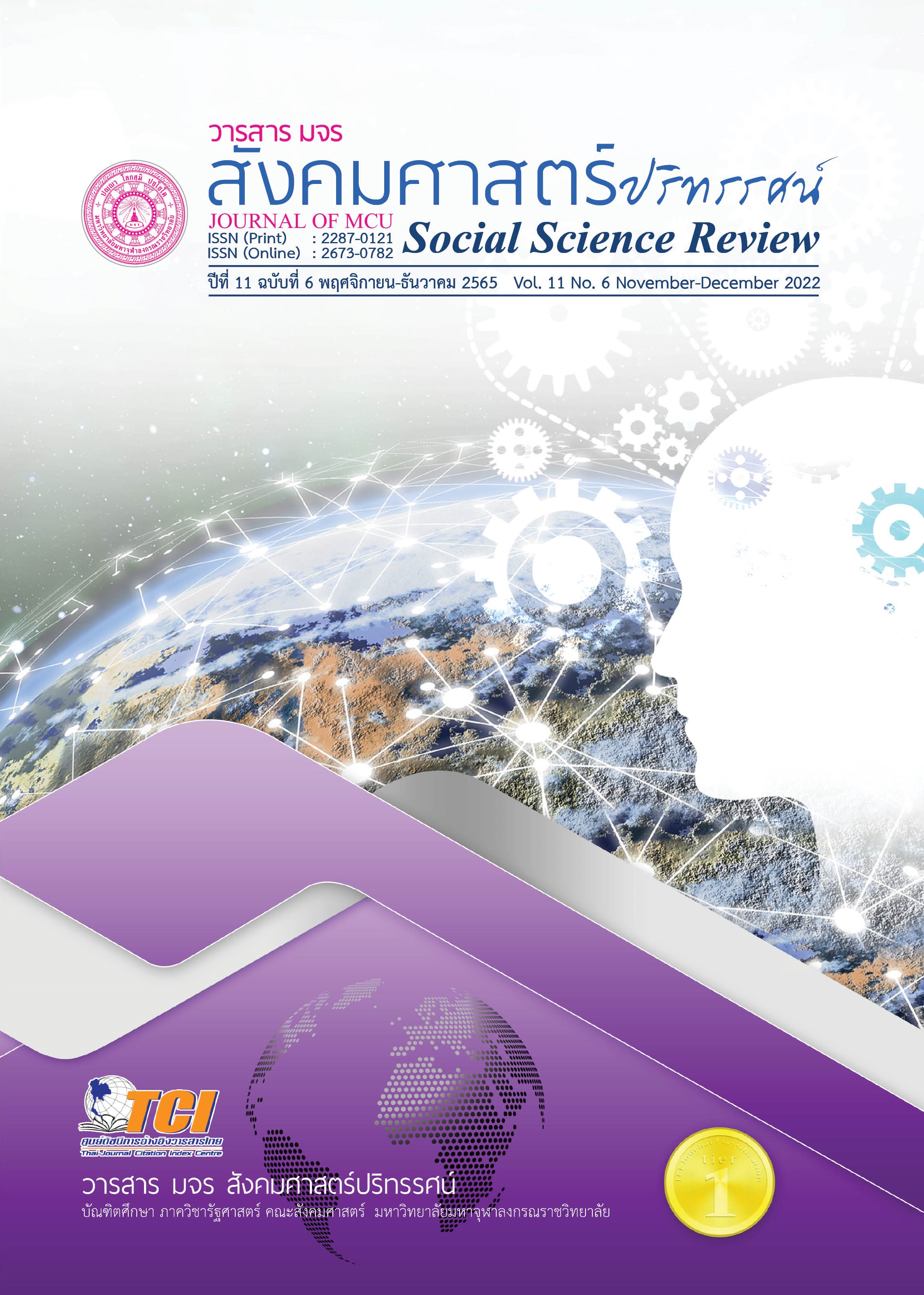ความสัมพันธ์ระหว่างทักษะภาวะผู้นำด้านซอฟท์สกิลของผู้บริหาร กับประสิทธิภาพการสร้างเครือข่าย “บวร” อย่างยั่งยืน ของโรงเรียนเศรษฐบุตรบำเพ็ญ เขตมีนบุรี
คำสำคัญ:
ความสัมพันธ์, ภาวะผู้นำ, ซอฟท์สกิล, ประสิทธิภาพ, เครือข่ายบวรบทคัดย่อ
บทความวิจัยนี้มีวัตถุประสงค์เพื่อศึกษา 1) ระดับทักษะภาวะผู้นำด้านซอฟท์สกิลของผู้บริหาร โรงเรียนเศรษฐบุตรบำเพ็ญ เขตมีนบุรี 2) ระดับประสิทธิภาพการสร้างเครือข่าย “บวร” อย่างยั่งยืนของโรงเรียนเศรษฐบุตรบำเพ็ญ เขตมีนบุรี 3) ความสัมพันธ์ระหว่างทักษะภาวะผู้นำด้านซอฟท์สกิลของผู้บริหาร กับประสิทธิภาพการสร้างเครือข่าย บวร อย่างยั่งยืน ประชากรที่เป็นผู้ให้ข้อมูลคือ บุคลากรในเครือข่าย “บวร” ของโรงเรียนเศรษฐบุตรบำเพ็ญ เขตมีนบุรี ประชากรประกอบด้วย ผู้บริหารสถานศึกษาและครู จำนวน 138 คน พระสงฆ์จำนวน 9 รูป และผู้ปกครองนักเรียน จำนวน 31 คน เครื่องมือที่ใช้ในการวิจัยเป็นแบบสอบถามมาตราส่วนประมาณค่า 5 ระดับ สร้างโดยผู้วิจัย มีค่าความเชื่อมั่น .982 สถิติที่ใช้ในการวิเคราะห์ข้อมูล ได้แก่ ค่าร้อยละ ค่าเฉลี่ย ส่วนเบี่ยงเบนมาตรฐาน และค่าสัมประสิทธิ์สหสัมพันธ์แบบเพียร์สัน
ผลการวิจัยพบว่า 1) ระดับทักษะภาวะผู้นำด้านซอฟท์สกิลของผู้บริหาร โรงเรียนเศรษฐบุตรบำเพ็ญ เขตมีนบุรี โดยภาพรวมและรายด้านอยู่ในระดับมาก 2) ระดับประสิทธิภาพการสร้างเครือข่าย “บวร” อย่างยั่งยืน ของโรงเรียนเศรษฐบุตรบำเพ็ญ เขตมีนบุรี โดยภาพรวมและรายด้านอยู่ในระดับมาก 3) ความสัมพันธ์ระหว่างทักษะภาวะผู้นำด้านซอฟท์สกิลของผู้บริหาร กับประสิทธิภาพการสร้างเครือข่าย บวร อย่างยั่งยืน ของโรงเรียนเศรษฐบุตรบำเพ็ญ เขตมีนบุรี ในภาพรวม มีความสัมพันธ์ทางบวก อยู่ในระดับสูงทุกด้าน อย่างมีนัยสำคัญทางสถิติที่ระดับ .01 (r=.845, p< .01)
เอกสารอ้างอิง
กุลทัต หงส์ชยางกูล. (2562). การสร้างและการบริหารเครือข่าย. สืบค้น16 กุมภาพันธ์ 2565, จาก http://hsmi2.psu.ac.th/upload/forum/paper_1598_5f69ce9304e915f6 9ce.pdf.
ชโลทร โชติกีรติเวช. (2560). ความต้องการจำเป็นในการพัฒนาทักษะ Soft Skills เพื่อการจัดการเรียนรู้ของครู ในสถานศึกษาสังกัดสำนักงานเขตพื้นที่การศึกษามัธยมศึกษา เขต 25. วารสารวิจัย มข (ฉบับบัณฑิตศึกษา) สาขามนุษยศาสตร์และสังคมศาสตร์, 5(1), 44-52.
ธนุเดช ธานี. (2559). การพัฒนาศักยภาพผู้นำรุ่นใหม่ เพื่อก้าวสู่การเป็นผู้บริหาร. สืบค้น 5 มีนาคม 2565, จาก https://www.peopledevelop.net/17018457/.
วาริษา ประเสริฐทรง. (2557). ทักษะภาวะผู้นำด้าน SOFT SKILLS ของผู้บริหารสถานศึกษาสังกัดสำนักงานเขตพื้นที่การศึกษามัธยมศึกษา เขต 25 (วิทยานิพนธ์ปริญญามหาบัณฑิต สาขาการบริหารการศึกษา). ขอนแก่น: มหาวิทยาลัยขอนแก่น.
วาลิกา อัครนิตย์. (2562). กลยุทธ์การสร้างเครือข่ายความร่วมมือเพื่อพัฒนาโรงเรียนในสำนักงานเขตพื้นที่การศึกษาประถมศึกษาบึงกาฬ (วิทยานิพนธ์ปริญญาดุษฎีบัณฑิต สาขาการบริหารการศึกษาและภาวะผู้นำ). สกลนคร: มหาวิทยาลัยราชภัฏสกลนคร.
วิจารณ์ พานิช. (2555). วิถีสร้างการเรียนรู้เพื่อศิษย์ในศตวรรษที่ 21. กรุงเทพฯ: มูลนิธิสดศรี-สฤษดิ์วงศ์.
วิชัย วงษ์ใหญ่ และ มารุต พัฒผล. (2562). Soft Skills to Master. กรุงเทพฯ: บัณฑิตวิทยาลัย มหาวิทยาลัยศรีนครินทรวิโรฒ.
สุธิดา กาญจนกันติกุล (2564). เทคนิคการสื่อสารของผู้นำในภาวะวิกฤต. สืบค้น 25 กุมภาพันธ์ 2565, จาก https://forbesthailand.com/commentaries/insights.
อภิสรรค์ ภาชนะวรรณ. (2564). การเสริมสร้างความสัมพันธ์ระหว่างโรงเรียนกับชุมชนของโรงเรียน สังกัด สำนักงานเขตพื้นที่การศึกษาประถมศึกษาสระบุรี เขต 2. วารสาร มจร สังคมศาสตร์ปริทรรศน์, 10(2), 211-224.
อริยา พรหมสุภา. (2559). “บวร” บ้าน วัด โรงเรียน องค์การแห่งการเรียนรู้ในชุมชน: ชุมชนโป่งคำ จังหวัดน่าน และชุมชนแจ่มหลวง จังหวัดเชียงใหม่ (วิทยานิพนธ์ปริญญาศิลปศาสตรมหาบัณฑิต สาขาการจัดการ) กรุงเทพฯ: มหาวิทยาลัยเทคโนโลยีพระจอมเกล้าธนบุรี.
ดาวน์โหลด
เผยแพร่แล้ว
รูปแบบการอ้างอิง
ฉบับ
ประเภทบทความ
สัญญาอนุญาต
ลิขสิทธิ์ (c) 2022 วารสาร มจร สังคมศาสตร์ปริทรรศน์

อนุญาตภายใต้เงื่อนไข Creative Commons Attribution-NonCommercial-NoDerivatives 4.0 International License.
เพื่อให้เป็นไปตามกฎหมายลิขสิทธิ์ ผู้นิพนธ์ทุกท่านต้องลงลายมือชื่อในแบบฟอร์มใบมอบลิขสิทธิ์บทความให้แก่วารสารฯ พร้อมกับบทความต้นฉบับที่ได้แก้ไขครั้งสุดท้าย นอกจากนี้ ผู้นิพนธ์ทุกท่านต้องยืนยันว่าบทความต้นฉบับที่ส่งมาตีพิมพ์นั้น ได้ส่งมาตีพิมพ์เฉพาะในวารสาร มจร สังคมศาสตร์ปริทรรศน์ เพียงแห่งเดียวเท่านั้น หากมีการใช้ภาพหรือตารางหรือเนื้อหาอื่นๆ ของผู้นิพนธ์อื่นที่ปรากฏในสิ่งตีพิมพ์อื่นมาแล้ว ผู้นิพนธ์ต้องขออนุญาตเจ้าของลิขสิทธิ์ก่อน พร้อมทั้งแสดงหนังสือที่ได้รับการยินยอมต่อบรรณาธิการ ก่อนที่บทความจะได้รับการตีพิมพ์ หากไม่เป็นไปตามข้อกำหนดเบื้องต้น ทางวารสารจะถอดบทความของท่านออกโดยไม่มีข้อยกเว้นใดๆ ทั้งสิ้น





